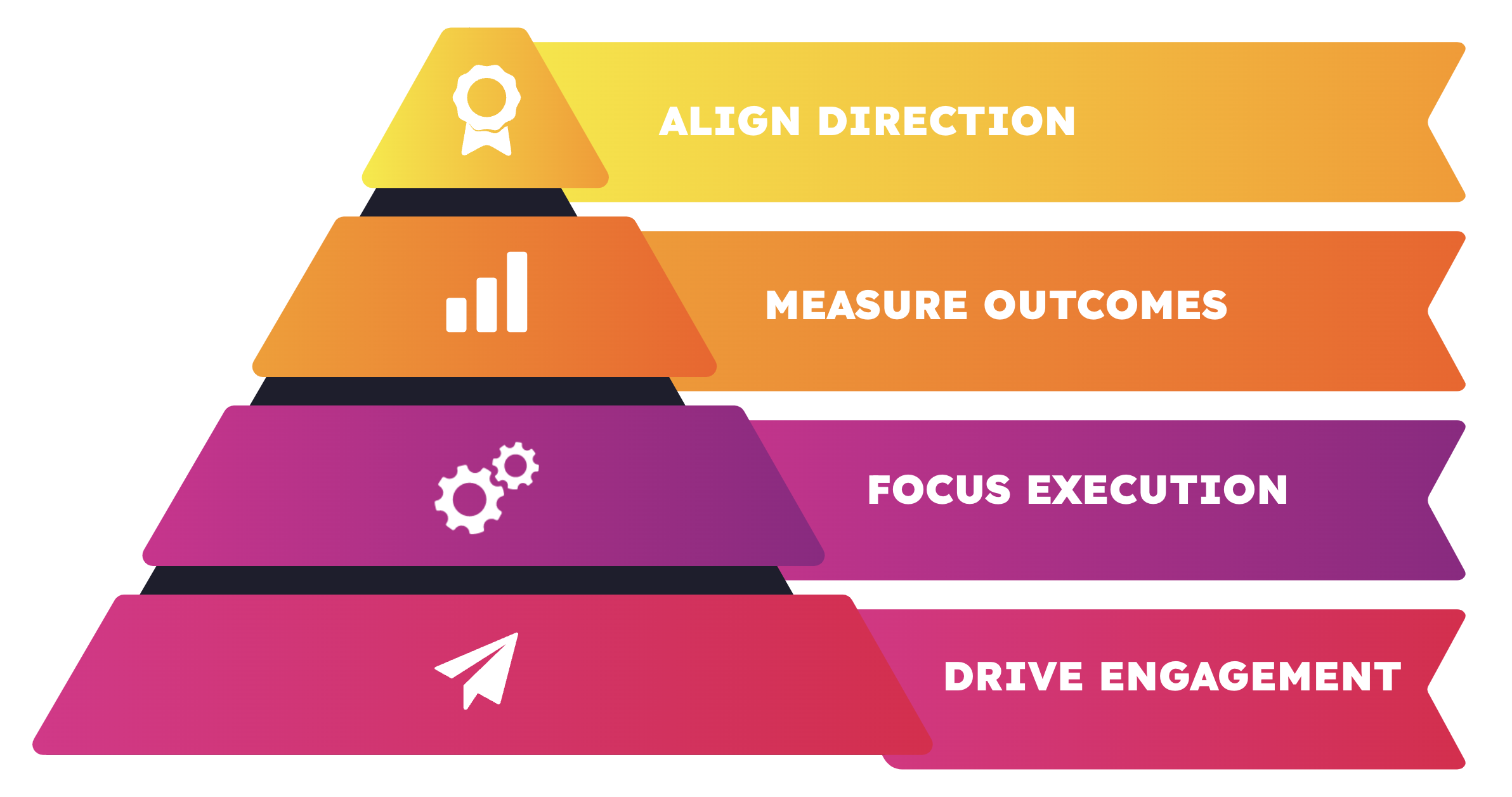8 min read
Rethink OKRs: Improve Cultural Engagement with Your Own System
Here we'll explore the backstory of OKRs, what's changing in the markets, and why it's important to stay ahead of the...
By: Stephen Newman Aug 13, 2023 5:12:00 PM

The difference between OKRs & KPIs is an ongoing conversation with the common narrative being "KPIs are for running the business, while OKRs are for changing the business." In theory, it makes sense, but in reality, it breaks down.
For starters, let's get one thing clear out of the gate. OKRs are a system of alignment, not some magical methodology. The whole reason operational leaders implement OKRs is to get updates across departments in a consistent format and increase visibility. The problem is teams struggle to understand how to create and categorize what they measure (Key Results) vs. what they work on (Initiatives), and how OKRs fit into their day-to-day. We'll get into those problems separately, but the main point here is all these metrics, frameworks, and definitions are supposed to just create simplicity of alignment, but oftentimes they backfire due to internal confusion. Let's change that.
Here we'll outline the real differences between OKRs and KPIs, and how to better incorporate the conversation into your teams.
#1 - Prioritize vs. Analyze: Keep it simple. OKRs are what you should prioritize. KPIs are what you should analyze. It even rhymes! In the vast ocean of data, metrics, to do lists, and distractions, what are the things that REALLY matter? Those are the OKRs. Objectives provide direction. Key Results quantify success. Initiatives focus execution. Check-Ins provide engagement. That's it. All companies use these four components, they just aren't very well defined or organized.
#2 - All Key Results are KPIs, but not all KPIs are Key Results: Let's use an example. Your company has a SaaS product which sells through an MRR model. MRR (or any revenue metric) is a pretty common KPI, but isn't that something you want to constantly monitor and improve? I think so. Alternatively, the conversion rate of email subscribers to paying customers might be an interesting KPI, but let's not look at it weekly, monthly, or quarterly. Let someone else call this out if/when it becomes a priority.
#3 - It's Really Just Semantics: Remove the word 'Key' from both of them and what do you have? 'Results' and 'Performance Indicators.' Let's go a step further and remove 'Performance' to compare one word to another. Now we're left with 'Results' and 'Indicators' which sound pretty similar right? Although there's a case to be made to think about these differently, they really are quite similar.

#4 - RUN the business with OKRs. REVIEW the business with KPIs: The best OKR implementations are where they are the "single source of truth," meaning it's the critical priorities of the business - both metrics and execution. Operations or a Chief of Staff leader should ideally own this function as they touch all facets of the company, not just people (HR). You get there by analyzing a lot of data and resources within your business.
#5 - Change is the Only Constant: In business, the only thing that stays the same in change, so separating these out doesn't make a lot of sense, especially at the strategic level. One view of the truth is what's needed, and everything else is just noise. You need to be on offense all the time, adapting, iterating, and evolving with the times. Staring at dashboards with no ambitions is a waste of time.
#6 - Financial Key Results / KPIs are Critical, But Not For All: The 'board' cares about certain critical financial metrics, but 99% of the rest of the company doesn't. EBIDITA. Profitability. CLTV. CAC. And the list goes on. That's the real difference here. The metrics the CFO finds critical need to be broken down into OKRs to drive change via exceptional execution, but have the self awareness to understand the majority of the company doesn't really care about some abscure finance data point buried 800 layers inside of a spreadsheet.

#7 - Quarterly Key Result Resets are Painful: If you're tracking the same critical metric every quarter, then why reset it? It's better to track it over time, but swap out the Initiatives you focus on each cycle to see what really moves the needle. OKRs are supposed to be on a quarterly cadence, based on best practices, but it's primarily for planning purposes.
#8 - Instead of Debating OKRs vs. KPIs, Focus on Initiatives - Execution is something we can all agree on, right? These are the main drivers of outcomes anyways, being able to execute, explore, and experiment. This is the fun part of OKRs, but it's not represented in the damn acronym (we're changing that). Let's level up the conversation and focus on driving results instead of talking about them.
#9 - Key Results Ideally Blend. KPIs Can Standalone - If you write good Objectives, they will blend together 3-5 Key Results which represent a combination of quality, quantity, and health metrics to create a balanced way to measure the Objective. It's not easy to do that, but the purpose behind it is to create a check and balance of your goals. You don't want to emphasize top-line metrics at the expense of your teams health. KPIs, on the other hand, can be looked at in a vacuum. The point here is simply to highlight that by unifying the conversation, you are removing data silos and focusing on the priorities, always.
To learn more about how we think about internal Operating Systems such as OKRs, check out our Radical Operations Playbook.
DOWNLOAD THE RADICAL OPERATIONS PLAYBOOK
Sep 7, 2023by Stephen Newman
Here we'll explore the backstory of OKRs, what's changing in the markets, and why it's important to stay ahead of the...
Aug 20, 2023by Stephen Newman
Let's skip the part where the basics of OKRs are shared and debates over definitions are had. Let's get right to the...
Aug 13, 2023by Stephen Newman
The difference between OKRs & KPIs is an ongoing conversation with the common narrative being "KPIs are for running the...